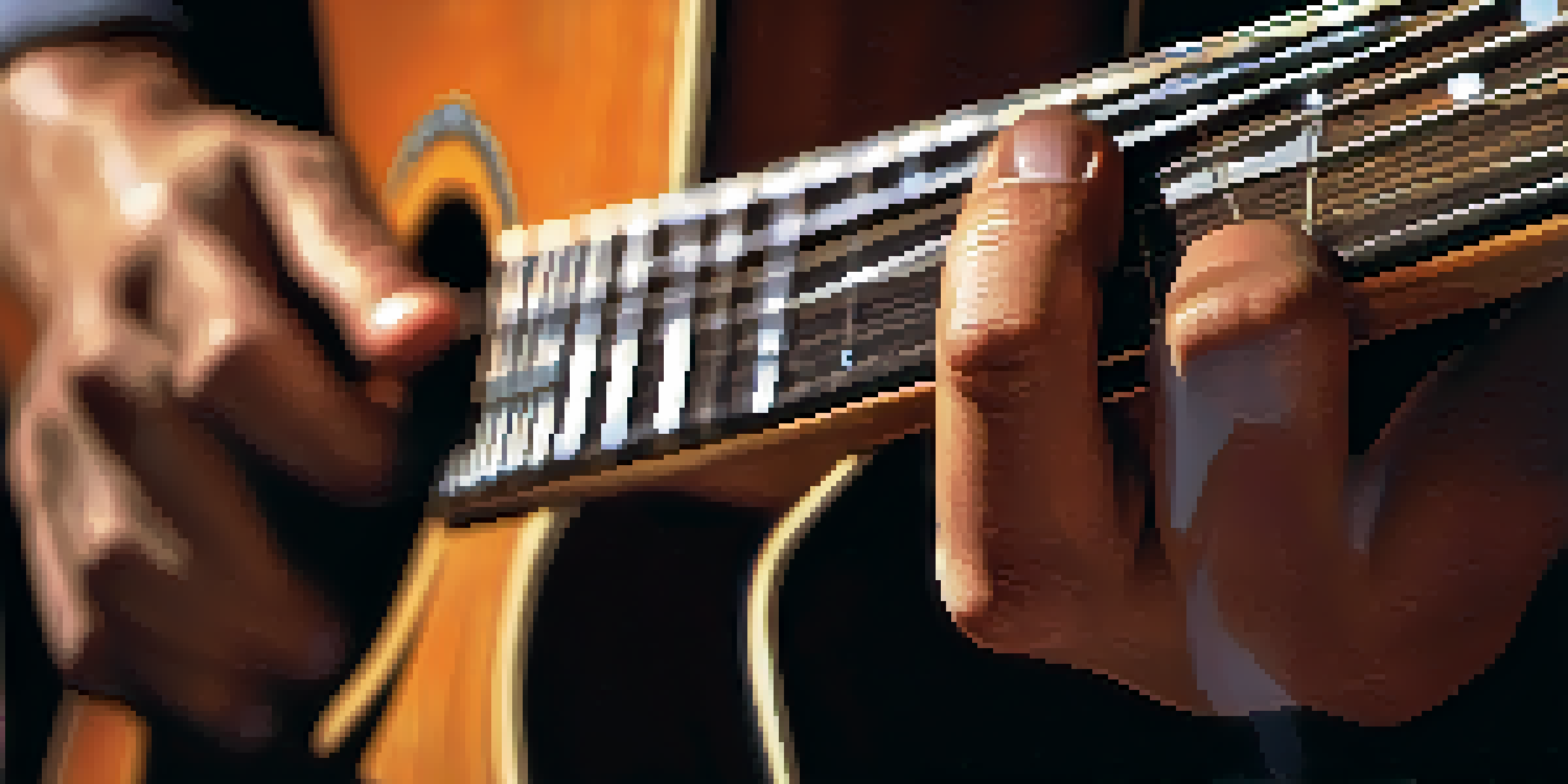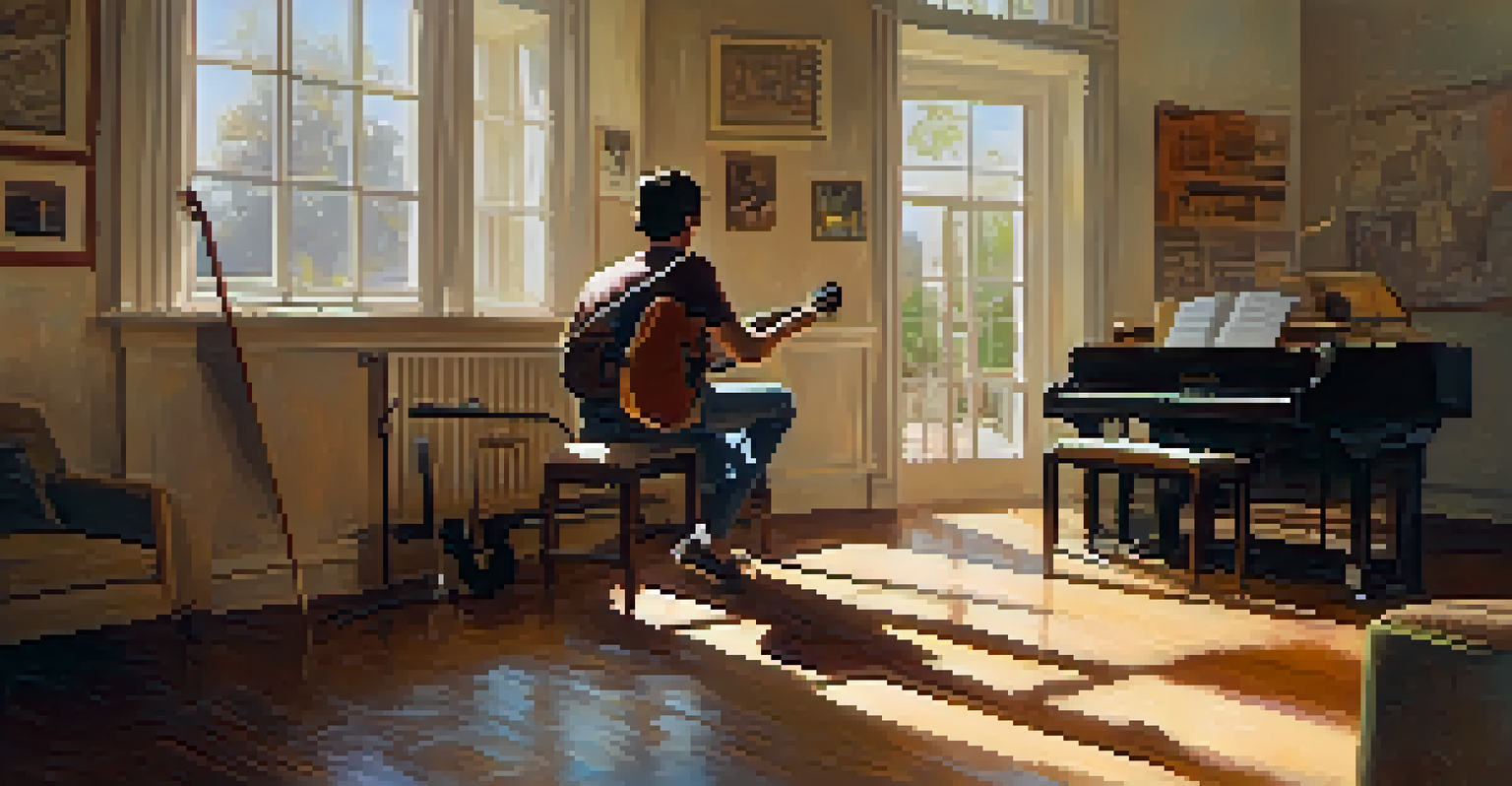Identifying Symptoms of Performance Anxiety in Guitarists

Understanding Performance Anxiety in Musicians
Performance anxiety is a common challenge for musicians, including guitarists. It often manifests as a fear of being judged or making mistakes while playing in front of others. Understanding this anxiety is the first step towards managing it effectively.
The only thing we have to fear is fear itself.
Guitarists may experience a range of emotions, from mild nervousness to intense panic, which can impact their performance. This phenomenon is not limited to beginners; even seasoned players can feel its effects. Recognizing that you're not alone can be a comforting realization.
By identifying the symptoms early, guitarists can take proactive steps to address their anxiety before it escalates. This awareness can lead to a more enjoyable and fulfilling playing experience, both for the musician and their audience.
Physical Symptoms of Performance Anxiety
One of the most noticeable symptoms of performance anxiety is physical discomfort. Guitarists might experience sweaty palms, rapid heartbeat, or even shaking hands right before or during a performance. These symptoms can make it challenging to focus and play well.

Additionally, muscle tension can plague many musicians, leading to stiffness that inhibits fluid playing. For a guitarist, this might mean struggling to execute techniques that usually come naturally. When the body is tense, the music often suffers, creating a frustrating cycle.
Understanding Performance Anxiety
Performance anxiety affects musicians of all levels, leading to feelings of fear and self-doubt during performances.
Being aware of these physical symptoms is crucial. Recognizing when your body is reacting to anxiety can help you implement relaxation techniques that calm both your mind and muscles, allowing for a more relaxed performance.
Emotional Symptoms Associated with Anxiety
Emotional symptoms of performance anxiety can be just as debilitating as physical ones. Guitarists may feel overwhelming fear or dread about performing, which can lead to avoidance behaviors, such as skipping gigs or practice sessions. This emotional toll can hinder growth and confidence.
It’s not the load that breaks you down, it’s the way you carry it.
Feelings of inadequacy or self-doubt are common as well. Guitarists might question their skills or worry about disappointing their audience, which can create a paralyzing fear of performing. Understanding these feelings is essential for addressing and overcoming them.
By acknowledging the emotional side of performance anxiety, guitarists can begin to challenge these negative thoughts. Support from friends, fellow musicians, or even professional help can provide valuable perspectives and coping strategies.
Cognitive Symptoms to Look For
Cognitive symptoms manifest as negative thought patterns that can sabotage a performance. A guitarist may find themselves fixating on potential mistakes or imagining scenarios where everything goes wrong. This mental spiral can lead to increased anxiety and decreased performance quality.
Another common cognitive symptom is difficulty concentrating. When a guitarist's mind is racing with anxious thoughts, it becomes challenging to focus on the music or the audience. This distraction can further exacerbate anxiety, creating a vicious cycle.
Identifying Symptoms of Anxiety
Both physical and emotional symptoms, such as muscle tension and overwhelming fear, can significantly impact a guitarist's ability to perform.
Recognizing these cognitive symptoms is essential for breaking the cycle of anxiety. Techniques such as mindfulness and positive visualization can help shift focus away from negative thoughts and back to the joy of playing music.
Behavioral Signs of Performance Anxiety
Performance anxiety often leads to specific behavioral changes in guitarists. For example, they may avoid performing altogether or limit their practice to private settings. This avoidance can stifle growth and lead to even more anxiety in the long run.
Some guitarists might develop compulsive behaviors, such as excessively rehearsing or over-preparing for a performance. While practice is important, over-preparation can create additional pressure and stress, ultimately leading to burnout.
Being aware of these behavioral signs is crucial for addressing performance anxiety. By setting realistic goals and gradually exposing themselves to performance situations, guitarists can build confidence and reduce avoidance behaviors.
Common Triggers for Performance Anxiety
Identifying common triggers can help guitarists better manage their performance anxiety. For instance, high-stakes situations, such as auditions or competitions, can elicit stronger feelings of anxiety. Understanding these triggers allows musicians to prepare mentally and emotionally.
Other triggers may include the size of the audience, the venue's atmosphere, or even the presence of familiar faces. Each guitarist may have different triggers, making it important to reflect on personal experiences to identify what causes heightened anxiety.
Coping Strategies for Musicians
Implementing relaxation techniques, thorough preparation, and seeking support can help guitarists manage performance anxiety effectively.
By recognizing these triggers, guitarists can develop strategies to cope with them. This might include visualization techniques or pre-performance rituals that help reduce anxiety and create a sense of control.
Coping Strategies for Guitarists
Effective coping strategies can make a world of difference for guitarists facing performance anxiety. Techniques such as deep breathing, progressive muscle relaxation, and mindfulness can help calm the mind and body before a performance. Implementing these practices can create a more relaxed state.
Additionally, preparing thoroughly and practicing regularly can build confidence. The more comfortable you are with your material, the less anxious you may feel when it's time to perform. Setting small, achievable goals can also help in building this confidence.

Finally, seeking support from fellow musicians or a mentor can provide encouragement and valuable insights. Sharing experiences and strategies can foster a sense of community and help guitarists feel less isolated in their struggles.
When to Seek Professional Help
It's important to recognize when performance anxiety becomes overwhelming. If anxiety consistently interferes with your ability to play or enjoy music, it may be time to seek professional help. A therapist or counselor specializing in performance anxiety can provide tailored strategies and support.
Cognitive-behavioral therapy (CBT) is one effective approach that many musicians find helpful. CBT focuses on changing negative thought patterns and behaviors, equipping guitarists with tools to manage their anxiety more effectively.
Ultimately, seeking help is a sign of strength, not weakness. With the right support, guitarists can learn to manage their performance anxiety, allowing their passion for music to shine through.